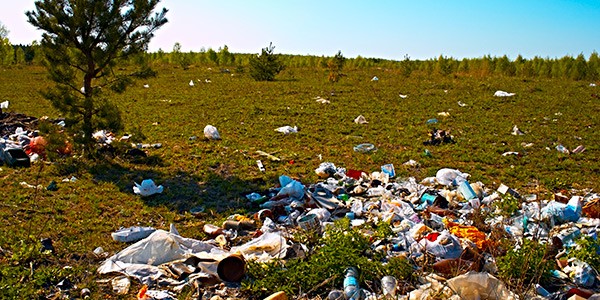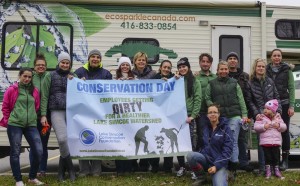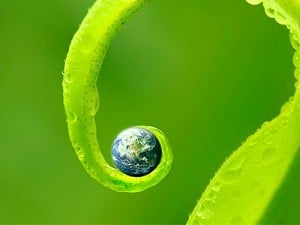At Ecosparkle, we believe that clean just isn’t clean unless it’s good for the planet too!
That’s why our Green Clean Team uses plant-based natural and organic cleaners in every home, office or retail space (including Newmarket’s Nature’s Emporium) that we visit!
This week, our Green Clean Team is taking a look into what the word “Biodegradable” really means, and how you can separate fact from fiction on the shelf!
Every Beginning Has an End.
More and more, Canadian consumers are asking questions about the products they use every day. They’re concerned about where their products come from and – increasingly – where they go when the wastebasket finally calls.
Enter the term ‘biodegradable‘, increasingly popular amongst ‘green’ marketers and often improperly used. Typically, it can be found gracing the packaging of ‘eco-friendly’ products throughout the retail environment.
The term itself implies environmentally sound practices and general earth-friendliness, yet – as with any marketing term – it is often used with varying degrees of legitimacy.
Unfortunately, many consumers are simply unaware that the term is mired in shades of grey.
This being the case, we’ve decided to shed some light on just what biodegradable really means, and perhaps give you a few more reasons why careful reading of labels should be a high priority for you!
What Are “Biodegradable Products” Anyways?
Truly biodegradable products are made from various materials – either liquid (such as cleaning detergents), or solid (such as plastics) – that break down with the assistance of microbial activities (by small organisms like ‘bacteria’) or through other natural processes, in order to return into the environment without leaving toxic residues behind.
The ability for a product to biodegrade effectively can depend on several factors, such as air exposure, temperature, liquid exposure, etc. Several products, like some ‘green’ plastic grocery bags, have been plagued by controversy regarding their biodegradability claims and labelling.
How Does One Define Biodegradability?
A diverse collection of private and public global agencies, such as ISO (International Standards Organization) and ASTM (American Society for Testing and Materials), produce a set of specifications and test methods that can be used to assess a given product’s level of “biodegradability”. Some, for instance, offer precise processes for measuring the amount that a product degrades over time.
However, importantly, this is where much of the misconception regarding the term “biodegradable” comes from.
These tests or specifications cannot themselves verify “biodegradability” of a given product – these tests or specifications are not certifications, and the organizations that outline the specific specifications or tests are not governing bodies. They have no regulatory power, and they do not verify or certify products on their own.
Many companies wrongly reference specifications or testing guidelines in product marketing, claiming that they’re product or material is certified biodegradable by one ASTM number or another. In many cases, these numbers are incorrectly referenced, and in all cases, any claim of certification received from one of these standards bodies would be incorrect in the first place.
This deceptive practice ultimately causes confusion in the market place and decreases the credibility of all truly environmentally friendly organizations.
The bottom line is that groups like ISO and ASTM do not regulate the term (as they have no regulatory power), do not assess standards for specific products, and the test methods that they share are not enough on their own to determine whether a product meets the grade or not.
For that judgement, one must turn to an independent certification body such as NSF or UL.
Biodegradable? Says Who?
As mentioned above, standards and specifications on their own are not enough to enable ethical or factual use of “biodegradable” terminology on a product or product family (although many unscrupulous or perhaps poorly informed businesses see no reason not to do so anyways).
That task is left to independent auditors, who apply these and other tests in order to make an assessment.
Groups such as BPI came into existence to create a framework within which these auditors could work, helping to build consensus in the industry, and providing an opportunity to help separate false claims from legitimate ones.
Biodegradable Products Institute or BPI, is a group made up of government, industry and educational facility members who provide independent auditors with standards that must be met (after testing using ASTM and other scientific methods) in order to gain the right to make certain product claims.
Under their logo, product testers such as NSF carry out product and material audits to assess details such as “compostability” and “biodegradability”.
In Canada, groups such as UL also provide rigorous product testing for sustainability and biodegradability through their “EcoLogo” certification (the only recognized environmental standards and certification mark in Canada).
Products that are verified by such organizations, including Ecosparkle favourites like Bio-Vert, are certainly a good place to look when assessing a potential purchase.
For more reading on the subject, don’t miss the following resources:
http://www.bpiworld.org/BPI-Public
http://homeguides.sfgate.com/biodegradable-products-78398.html
http://green-plastics.net/news/45-science/107-bioplastic-standards-101
The Bottom Line
After considering the information above, you’re in a much better position to choose well on your next trip for cleaning supplies. Remember:
- When looking for biodegradable products, always look beyond the marketing on the front of the label. Check carefully that claims have been certified by globally recognized certification bodies such as EcoLogo and NSF.
- Remember to think carefully about claims made, and avoid any products that claim certification from non-certifying bodies such as ASTM.
By taking these basic steps, you can avoid the ubiquitous green-washing scams and find real producers who are making a difference for the next generation.
And Remember…
We’d love to help you discover the Green Clean difference in your home, office or retail space!
We’ve got 5 years of experience finding the perfect natural, eco-friendly biodegradable cleaning solutions for our customers, and have been voted ‘Best Cleaning Company’ 5 years in a row in the ‘Era Banner Reader’s Choice Survey’ right here in the York Region and the Greater Toronto Area.
We invite you to schedule a free quote with our Green Clean Team today, and learn how affordable natural and organic cleaning can be for your family – backed by our 100% satisfaction guarantee!




